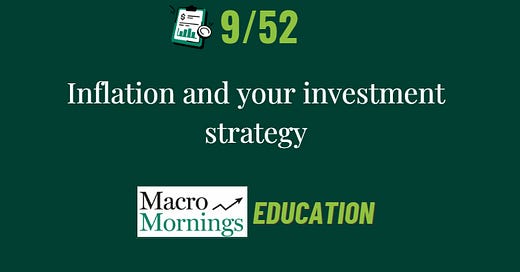💡 New on Macro Mornings? Start here
👨🎓 This is part of a 52-week series on macroeconomics designed to build your knowledge step by step. Feel free to catch up on previous emails here if you'd like to start from the beginning!
Dear all,
We’ve discussed how inflation affects your savings; now, let’s explore how it impacts your investment strategy.
Inflation doesn’t just erode the value of money - it also affects different asset classes in various ways.
Understanding these effects can help you adjust your investment strategy to protect and grow your wealth.
Here are a few ways to consider inflation in your investment decisions:
Stocks as a Hedge Against Inflation
Historically, stocks have outpaced inflation over the long term.
Companies can often pass increased costs on to consumers, which helps maintain their profit margins.
For example, if inflation causes the cost of raw materials to rise, a company might increase the prices of its products, preserving its profitability and potentially…
Keep reading with a 7-day free trial
Subscribe to Macro Mornings 💡 to keep reading this post and get 7 days of free access to the full post archives.




